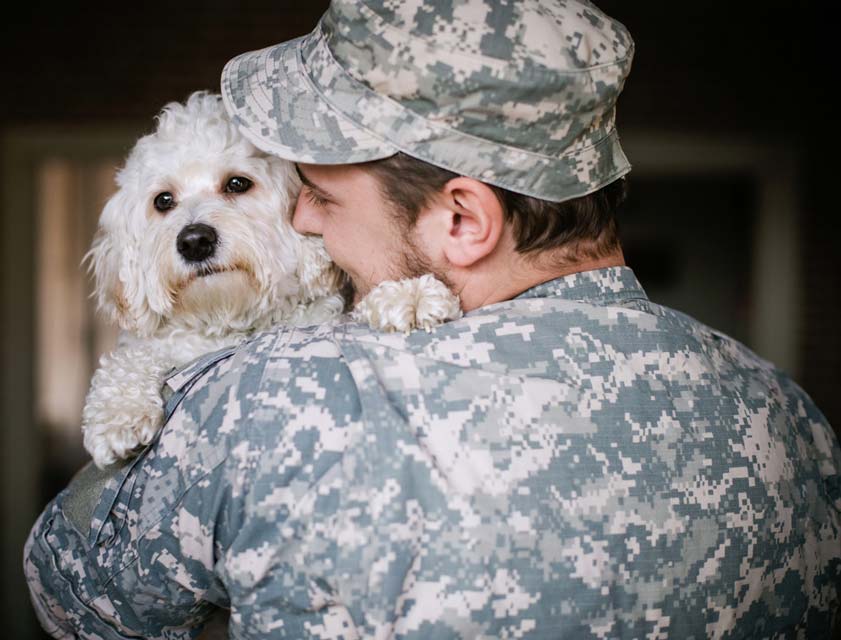Benefits of Having Dogs for People with PTSD

Post-traumatic stress disorder (PTSD) is an anxiety condition that can occur in people who have gone through a significantly traumatic event. It's common in military personnel who have been in war zones, and it can occur secondary to traumatic childhood or adult experiences too.
What Are the Symptoms of PTSD?
People with PTSD often experience some or all of the following symptoms:
- Hypervigilance, or being extremely aware of their surroundings and on the lookout for danger at all times.
- Flash-backs of the traumatic event occur in response to triggers which often involve sounds or smells. These flashbacks are incredibly real and distressing to the individual experiencing them.
- Nightmares are often frequent and terrifying in people with PTSD.
- Difficulty with relationships can occur due to feelings of numbness in a person experiencing PTSD and trouble processing emotions.
PTSD must be diagnosed by a professional. If you are having symptoms that you feel might indicate PTSD, visit your doctor right away.
Treatment for PTSD
Many treatments can be helpful for people with PTSD, but there is not currently a cure for the condition. Therapies that help many people include:
- Cognitive behavior therapy, during which a person retrains themselves to react differently to PTSD triggers and to negative thoughts and emotions.
- Medications for anxiety can help some people deal with the symptoms of PTSD.
- Desensitization therapy, where a person with PTSD is exposed, slowly and while in the care of trained professionals, to their triggers and train their brain not to respond to them.
New treatments and therapies are being developed all the time, and often, a combination approach using multiple techniques can help someone with PTSD the most. For instance, orange essential oil has shown benefits in studies for those with PTSD.
Dogs and PTSD
Dogs are being used more and more to help people in their daily lives. They can be trained to help people with physical disabilities. Some are trained to aid children and adults on the autism spectrum. Others can help those with PTSD symptoms. Here are some of the ways dogs can help those with PTSD:
- Dogs can help with hypervigilance symptoms. Dogs are generally excellent at watching for danger, so people with PTSD often feel comfortable letting their guard down a little when they are with a dog. They can rely on the dog to let them know if there is real danger around so that they can relax some of their own attention.
- Dogs love and trust unconditionally. When a person with PTSD develops a loving, trusting relationship with a dog, it can help them relearn trust themselves, which was often strained or lost when they experienced their trauma.
- Dogs can be trained to intervene. Dogs can be specially trained to intervene if a person is having a nightmare or an emotionally distressing episode. Shortening such incidents and helping the person regain calm can be incredibly helpful to someone dealing with PTSD.
- Dogs take orders. This can be especially helpful to military personnel with PTSD. When they re-enter civilian life, some military personnel have trouble adjusting to civilian life without as much order giving and taking. Dogs can help release the order-giving instinct.
As you can see, there are many ways in which dogs can help people with PTSD, either as companions or as trained service dogs. Other pets can help, too, especially with companionship and unconditional love, but dogs have specific qualities that lend themselves to aiding with many of the particular things with which those with PTSD might struggle.
You May Also Like These Articles:
8 Ways Dogs Can Help People with Health Conditions
Can Dogs Sniff out Infections?
5 Dogs (or Dog Teams) Made Famous by History
Dogs Make the Best Matchmakers
Is It OK to Let Your Dog Lick Your Face?
Things We Do That Annoy Our Dogs - Slideshow
Disclaimer: This website is not intended to replace professional consultation, diagnosis, or treatment by a licensed veterinarian. If you require any veterinary related advice, contact your veterinarian promptly. Information at DogHealth.com is exclusively of a general reference nature. Do not disregard veterinary advice or delay treatment as a result of accessing information at this site. Just Answer is an external service not affiliated with DogHealth.com.


